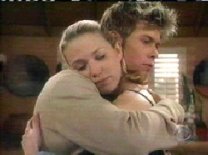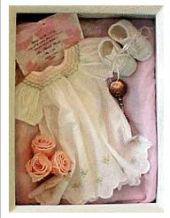 |
“Grief knits two hearts in closer bonds than happiness ever can; and common sufferings are far stronger links than common joys” ~Alphonse de Lamartine (1790-1869) |
Parents grief…
In our previous discussions about the different types of losses by death that may occur, we have made note of how difficult and trying most of them can be. Grief following sudden death, trauma, suicide or murder can be very hard to deal with due to the emotional overlay usually present.
But no matter how one loses a child, whether by prolonged illness or sudden death, the loss of a child is perhaps the most profound, the most overwhelming, the most inconsolable of losses to deal with.
There are many reasons for this:
- It violates the natural order of things— your children are not supposed to die before you.
- Your love for your child is unconditional and pure— perhaps the most profound of attachments you will ever have.
- It evokes rage at the injustice of it all— it’s not fair for an innocent to lose his potential and fail to see his dreams fulfilled.
GUILT
Parent’s grief…
You as a parent are responsible for the well-being of your children. No matter how random the accident was, you will probably feel like you let your baby down. You may feel responsible for the death, even if that blame is not justified. A woman may blame a miscarriage or stillbirth on something she did during pregnancy.
The uncertain causes of a SIDS death brings a special kind of guilty hell for parents who think there was something they could have done to prevent the death. Guilt is almost always present in the death of a child. We are so very sorry for the loss of your child and wish you strength to make it through.
BLAME
Parent’s grief…
It is very common for bereaved parents to have a strong need to blame someone for the death of their child, and/or to find the cause. You must take care, however, to avoid unfairly blaming other family members or your spouse.
Accusations you make during the shock and anger of your child’s death can cause irreparable damage to your family or marriage. Hold your tongue now so you’ll have no regrets later.
STIGMA
Parent’s grief…
Following the loss of your child, you may find that some of your friends avoid you. The death will make them very uncomfortable. It may force them to contemplate the mortality of their own kids (It could happen to them).
Friends and acquaintances just don’t know what to say or how to help you. If only they knew that all you wanted was for them to listen! Sadly, emotional and social support is often withdrawn when you need it the most.
If they do show up later in your mourning, it will be to encourage you to get over the loss. Why? Grief due to losing a child is so painful that they just want it to go away. If only it were that easy!
It has been said that a major tragedy will either bind a couple together, or tear them apart. It’s true. If your marriage or relationship was conflicted or on shaky ground before this tragedy happens, it may be difficult to save it.
In lashing out at the injustice of the loss, you may well blame your partner for the death, which can be devastating. People also grieve in different ways, so try not to misunderstand motives, reactions and feelings that may be different from yours.
Marriage counseling may help you two see what is happening to you, and perhaps help save the marriage. Hopefully, after the initial shock has worn off, you will reach for each other for support at this most difficult time.
Try to share your feelings with your mate, and talk about it often. Although you certainly wouldn’t have chosen this way, tragedy has the potential of creating an even stronger love bond between you two, born of necessity.
The Death of a Baby:
Stillbirth, Miscarriage, Abortion & Infant Death
Parent’s grief…
Your baby’s death is the most painful and traumatic thing that could ever happen you. Aside from the features described above about the loss of a child of any age, infant death comes with a set of problems all it’s own.
Outsiders don’t look at the death of an infant in quite the same way as they do older children. Either consciously or subconsciously, they don’t feel that the loss should be as great, or the grief as long, because you did not know the child as long as you would an older child.
Now, you know how absurd this is, but try to understand; that is the reason for their lack of empathy. (In their mind, it’s “just a miscarriage”). They may not understand your intense grief, or not know what to say. In their efforts to comfort you, they may say something incredibly stupid or hurtful, like:
- “Well, at least you’re young enough to have more children.”
- “You were lucky that you miscarried early in your pregnancy.”
- “Thank God you didn’t bring the baby home from the hospital.”
How insensitive! Try to find it in your heart to forgive their ignorance. They surely do mean well. Tragedy can be awkward and foreign to them.
Even in an early term miscarriage, it is important for you to affirm your great loss and mourn fully. It was not “just a miscarriage” to you… it was YOUR BABY.
Mothers and fathers begin emotional bonding long before they get to know a child on the outside. The fluttering of life inside you… when the father feels the kicking… that’s when you start being parents in your hearts.
Whether due to miscarriage, abortion, stillbirth or infant death, it’s a great loss for you both. You have experienced the loss of a loved one, and you may grieve for a very long time. This is normal and should be encouraged.
Abortion… the hidden death. Often, abortion is a secret loss that you would rather forget. You may feel relieved on the surface, but loss by abortion must be mourned, too. Do not rob yourself of the much-needed period of grief to bring resolution to the experience.
Things That Might Help
Parent’s grief…
Due to circumstances, you may not have many physical “remembrances” of your lost child. Try to find some. Photos, hospital records, certificates, a baby blanket or knit cap, footprint, lock of hair, nursery bracelet, and sympathy cards can all help enforce the importance of your loss. Make a baby book or keep your mementos in a special box.

Name the baby, no matter what age of gestation. Have a funeral or memorial service. Claim your right to grieve fully. Fathers need to grieve, too. Just because they are supposed to be the “strong silent protectors” doesn’t mean they don’t feel the pain of loss deeply and need to grieve as well.
Parents who have lost a child can feel alone and unsupported in their grief… because they usually are. Support groups of other bereaved parents can be especially helpful to you, because those folks will understand better than anyone else the pain you feel.
While friends and acquaintances may feel uncomfortable listening to you express your grief, support groups will be much more apt to lend a sympathetic ear. Those who have “been there” can truly understand and accept your grief. You may find much-needed support here:
- The Candlelighters (Now called ACCO: American Childhood Cancer Organization)– for parents of very sick or dying children:www.acco.org
- The Compassionate Friends– help after the death of your child of any age:
www.thecompassionatefriends.comCompassionate Friends also holds a Worldwide Candle Lighting each December in memory of the lives of children lost. As candles burn down in one time zone, they are lighted in the next, creating a 24-hour wave of light that encircles the entire globe. You may find comfort in participating in this special ceremony. (See the link on their website for details).
- National SIDS & Infant Death Program Support Center 800-638-7437
You may also find some comfort in one of these excellent books that deal with the loss of a child.
Amazon affiliate links:
Return from Parents Grief to “Your Pain”
